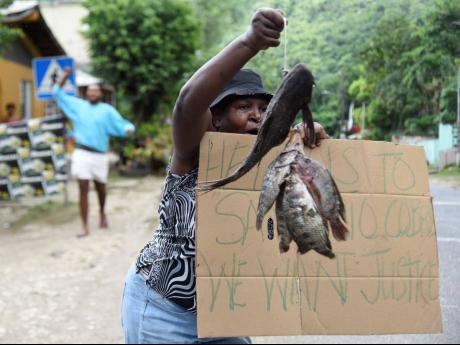Agri ministry takes aim at Windalco
The Ministry of Agriculture and Fisheries has directed the National Irrigation Commission (NIC) working with other agencies, such as the Rural Agricultural Development Authority and the Jamaica Agricultural Society, among other agencies, to do an evaluation of the overall deleterious impact of the cause of a recent fish kill in the Rio Cobre, with the aim of farmers and fishers making a claim for damages on Windalco. The company has been implicated in the discharge of trade effluent from its bauxite plant in Ewarton, St Catherine, which allegedly entered and contaminated the river.
Since then, the NIC, which supplies irrigated water to livestock and crop farmers, as well as fish farmers along the river, has cut off the supply in a bid to reduce the risk of spreading the contaminant.
Minister of Agriculture and Fisheries Pearnel Charles Jr on Wednesday broke his silence on the matter, vowing to assist farmers and fishers in taking legal action against the bauxite company.
“I have to speak about this issue with Windalco and what has taken place in the Rio Cobre because it is more than unacceptable,” he told the official commissioning ceremony for an amphibious excavator at Rocky Hill, St Elizabeth.
Charles noted that in addition to the fallout from the chemical spill, livestock and crop farmers as well as fish farmers are being adversely impacted by the NIC’s decision to lock off the water, in a bid to prevent further spread of the contaminant.
“The farmers and the fish farmers in those areas who depend on water from that stream have been completely cut off for days, so we can expect that an entire reaping cycle has been disrupted. Hundreds, perhaps hundreds of thousands of fish that are being grown by aquaculture experts have been negatively impacted, and what do we say about that?
“At the ministry, we are going to do all we can to give support to those farmers. If it means getting them out there one by one or bringing them together and giving them the support to make the claims under class action that they require. That’s what were gonna do, enough is enough,” Charles, who is an attorney-at-law, told the commissioning.
Meanwhile, Chief Executive Officer of the NIC, Joseph Gyles, told The Gleaner that they have been working with the National Environment and Planning Agency (NEPA), the Ministry of Health and Wellness, among other stakeholders, and is awaiting word from the latter, to say when it will be safe to turn the water back on.
For its part, the NIC has been scouring the length and breadth of its affected irrigation network to remove all the dead fish and cleanse it off any remaining contaminants.
“We are just waiting on the Ministry of Health to give us a clean bill of health to tell us what I am expecting, that by no later than this weekend to resume the service to our fishers and farmers.”
However, it may already be too late for crop farmers on the old Bernard Lodge Sugar Estate, whose crops are already wilting due to the lack of water, as well as the sweltering heat wave. When The Gleaner visited some farmers on Tuesday, Paul Henry and his colleagues involved in papaya and melon cultivation were already reporting serious damage to their crops. They showed papaya which was speckled and sections of the tree where blossoms had already died up – a direct impact of the last five days without any irrigation water. They insist that even after the water is turned on, it will take another three to five days to reach their farms.
Gyles, who gave the assurance that the volume of the water would be increased when it comes back on, declared that it should not take more than two days to reach them. He is adamant that despite the devastating losses farmers and fishers have already suffered, the potential damage that could be suffered by livestock farmers – beef and dairy, goats, broiler and poultry, could run into millions of dollars, if their animals are poisoned by the water. That is a risk the NIC is not prepared to take, he insisted.

